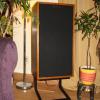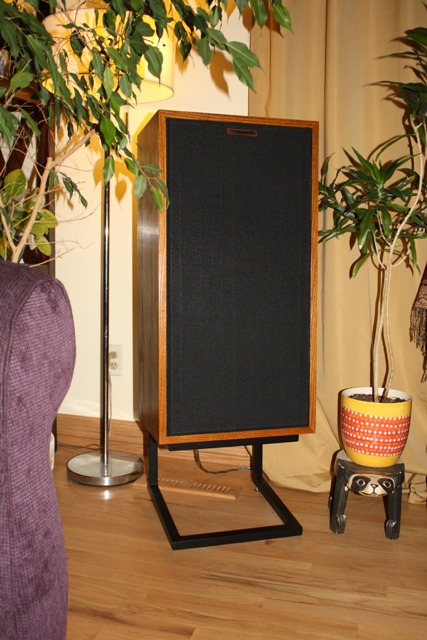-
Posts
1136 -
Joined
-
Last visited
Content Type
Forums
Events
Gallery
Everything posted by Ski Bum
-
With a screen name like Quadraphonic, I figured you would be familiar with other old school approaches too! I just mentioned it as an alternative to four speaker stereo that wouldn't require more kit.
-
You could *probably* do a ghetto Hafler setup. (Probably, because of the McIntosh amp. It can be done with most typical ss a/b amps, unsure if it would with the Mac.)
-

Forte vs heresy small room speakers close to wall
Ski Bum replied to Cadmobile500's topic in General Klipsch Info
Couple thoughts... Your room won't allow the sort of boundary reinforcement for the bass (due to the doorway recess on the left and hallway behind the right), so not surprised about their mid-centric presentation. Don't be afraid to use some sort of eq to taste. The added weight on the passive will reduce it's resonance frequency. This will result in a shallower roll off, and smear out the band where the pr supports the active driver, so may pay dividends as far as room gain and reduced cone motion. (Crudely, it's like going from a typical reflex alignment to something closer to aperiodic loading with a low-tuned variovent.) The risk is associated with exceeding woofer xmax. The woofer and pr decouple at a an even lower frequency than stock due to the added weight on the pr. Woofer excursion may increase at it's resonance freq (would have to model the driver, box, and lower tuned pr to know the specifics) but it would likely require drunkard-style use of the volume knob to put them at risk. The refinished cabs look pretty good! -
A larger and more stable sweet zone can be achieved via time/intensity trading. Toe the speakers in such that their direct axis cross well in front of the main listening position. Give it a try and report back.
-
Yes, you can put them on stands. Yes, it will adversely affect bass, as they won't be directly coupled to the floor. (Linkwitz transform type bass eq fixes it right up.)
-
The higher end Yamahas lack the variable loudness control that a few of their lower tier still has. I've always found it to be quite useful, particularly for Heritage models, which seem to be voiced at loud levels, where my preferred listening levels are considerably lower, where lower sensitivity to extreme frequencies come into play. When the fancy, expensive AVR decided to bake it's hdmi board to a dysfunctional crisp, I threw in an old Yamaha stereo receiver so we at least had music and sound for the boob tube. Had been using Audyssey DynamicEQ, their version of variable loudness eq. I immediately came to appreciate the relative simplicity, versatility, and effectiveness of Yamaha's old fashioned approach.
-
Get something with tone controls perhaps? Yamaha stereo gear has useful tone and variable loudness controls. Prolly more reliable than the boutique stuff too.
-

Replacing KEF Q600C with a Klipsch RC 64 III...anyone used KEFs before?
Ski Bum replied to MNKhawaja's topic in Home Theater
Ideally, your L, C, and R should be identical. The KEF center, by virtue of it's coax design, is more of an ideal match to your mains and less of a compromise than a horizontal two way Klipsch center. Maybe try goosing the center channel a few db before spending big bucks on a speaker upgrade. Unless the KEFs are distorting, increasing the center channel should help increase speech intelligibility. Could also be diffraction from poor placement. You don't have the center recessed into a cubby in an entertainment center, do you? -

Am I crazy to keep Forte ii over Chorus ii'??
Ski Bum replied to Imsjry's topic in 2-Channel Home Audio
It's not "just" a room thing (DaveA makes a valid point re vintage kit, ), but it is the most influential thing and something you can manipulate. The biggest practical difference between your speakers is sensitivity, so for a valid comparison you would have to set the volume about 3db higher with the fortes. Under such circumstances, the fortes may sound equally forward as the chorus. Both chorus II and fII rely on boundary reinforcement for balanced tonal response, so play with how deeply into corners and/or close to walls you can place them. Doing so with the chorus could restore the bottom end to balance with the mids. You'll be surprised by how dramatic a difference a few inches make, particularly as proximity to corners increases. So my suggestion is play around with placement, including toe-in (just as you can tune the bass with placement, the narrow controlled pattern of the mids/tweets can be taken advantage of, e.g. don't place speakers so the main listening position is directly on axis, don't spray high frequencies on walls adjacent to the speakers, expand the sweet spot by taking advantage of time-intensity trading...). -

Am I crazy to keep Forte ii over Chorus ii'??
Ski Bum replied to Imsjry's topic in 2-Channel Home Audio
Yes, the fII dig slightly deeper. They're a tad less sensitive as well, but with your room and close proximity that doesn't matter. Each speaker/room pairing is it's own idiosyncratic acoustic thing, and from your description the fortes are the more copacetic match. -
1) On the right track, but I'm with the others suggestions re Jubs/Khorns, which are >>>Rf7. If it's for a behind a screen install where looks don't matter (or if looks simply don't matter), the KI-396 >> RF7. Heck, CW and Forte > RF7 IMO, but that's more debatable. 2) Focals are quite nice. Different approach than Klipsch, similar to what you have with the Dynaudios. (Think room interaction...which approach would suit your situation the best, a speaker with broad dispersion or one with more controlled, narrower dispersion?) 3) What the...? I would never personally spend what you are suggesting for your budget on some odd-ball idiosyncratic design out of left field.
-
Left eye shooter, that's a bit of a false equivalency, but nice try. Consumer staples are not the same as niche luxury goods. FWIW, half my neighbors brew their own beer (more power to them, it's a messy, smelly hobby) and use soda streams to make their own pop (far cheaper, less waste for the landfills). And, perhaps ironically, that MicroXOTL thingie is in a black metal box, hardly the pinnacle of artisan creativity. My latest build is a plain black box too. As for your suggested design inferiority, that comes from Nelson Pass, whose pedigree and design chops are far from inferior. The impedance matching tech is interesting, but the cost is a still a huge turn off. Maybe when they sell the boards at the DIY sites like Pass does with his niche kit then I'll find it more compelling. But as it is, the thing would have to be made of solid gold to justify $8K/pair pricing.
-
Erik, if it makes you feel better, I consider pretty much all commercial tube kit to be a rip off. My sense of value has been forged in the DIY realm, which was at least partially inspired by YOU a decade or so ago. So really, it's all your fault!😛
-
Thanks, Erik, I was hoping to spur some discussion, not misrepresent anybody or anything negatively. Some of us participating in this very thread actually do know what OTL means, have familiarity with parafeed output, etc. If there is merit to the approach, any approach, it should be touted in a way as to not insult our intelligence. Links to the patents may be more useful than links to product pages that are devoid of technical information. Ok, having read the patents at the link you provided, it's still a shockingly poor value proposition IMO.
-
Initial impression? A shockingly poor value proposition. Erik, any more specific details about this amp's "thinking and design" you care to share? The product page was long on non-technical postmodernism, short on specifics.
-

Subconscious Auditory Effects of Quasi-Linear Phase Loudspeakers
Ski Bum replied to Chris A's topic in Technical/Restorations
It's some chewy food for thought, for sure. Anyone offering a shallow slope, "phase focused" passive two way networks for Jubs yet? Could it be done without the complexity that Danley came up with? I've been toying with the idea of doing some Chris style 402 based MEH, but would probably be more inclined if it could be done passively. Until the budget allows, I'll just have to get my phase correct listening via TB full rangers, or suffer through that horrid phase distortion with my fortes (to their credit, Klipsch heritage three ways push the troublesome crossover frequencies outside our hearing's most sensitive band, which has gotta help somewhat). -
On cue, one of the postmodernists chimes in with a rather bizarre contribution to the thread.
-

Advice for Beginners - consider this test from an audio club
Ski Bum replied to ODS123's topic in General Klipsch Info
There's that stubborn ferocity. -
Don't fall for the kooky magic wire postmodernism. Doing so will cost ya. Save your ducats.
-
More often than not, speakers with dual woofers have them wired in parallel and thus tend to present a low-ish load. To be on the safe side, @emmvette, you should probably limit your choice of amps to those rated into 4 ohm loads. There should be plenty of viable options to choose from on the used market in Chicago.
-

Advice for Beginners - consider this test from an audio club
Ski Bum replied to ODS123's topic in General Klipsch Info
Says the guy who eschews validation testing lest the results conflict with his beliefs. Pot, meet kettle. Those are testable claims, and the onus is on those claiming such things to support them. They never actually do, but they are quite predictable in their responses defending their beliefs, often with stubborn ferocity. Feynman said the easiest person to fool is oneself. He was right, and all the golden ears posting here are proof of that. I think it's Shakey, Tiz, and Dave who should start their own forum, where they can bask in the warmth of validation from fellow golden ears, free from the unwelcome intrusion of rationalism, and more concerned with happy fun shopping time, as they share anecdotes from their respective "buy and try" primrose paths of blind consumerism. -
Maynard, I think I would rather take my chances with a Lil' Sweetie, and spare my wallet the damage!
-

Rp280 Stereo pre/power Amp Recommendation?
Ski Bum replied to KingOfTheNorth's topic in 2-Channel Home Audio
Sure they do, just not at the home hi fi shops. Here you go: https://www.crownaudio.com/en/distributors/search?utf8=✓&country=Norway&commit=submit For home use, the xls 1502 is the one you probably want. It's on par with any consumer amp in performance, and trounces them in value. -
For example, the Outlaw 2200 amps put out 300w@4ohms, for about $350 apiece. Someone is selling a really nice ATI 1802 in the garage sale sub-forum for an outrageously good price now as well.
-
More sensitive speakers do reveal more of what's fed to them, warts and all. It's a worthy price to pay for that "involvement" you mention. Regarding imaging/soundstage, the more narrow pattern of the fortes can take advantage of time/intensity trading and thus they're capable of imaging trickery in ways that your old B&W never pull off. If even just for shits and giggles, try them with rather extreme toe in, where the speaker axis cross well in front of the main listening position. Doing so will expand the sweet spot into a much more broad sweet zone, and perhaps more importantly, it will stabilize the image (it doesn't change when you move around in your chair).





